| Subject: | PREMIER HORGAN! During a news conference on CHEK TV news last night did we really hear you use the words ‘CLIMATE CRISIS’? |
|---|---|
| Date: | Wed, 30 Jun 2021 15:01:16 +0000 |
| From: | Rosemary Baxter <email hidden; JavaScript is required> |
| To: | email hidden; JavaScript is required |
| CC: | Adam Olsen email hidden; JavaScript is required, email hidden; JavaScript is required, email hidden; JavaScript is required, email hidden; JavaScript is required |
June 30th, 2012
Premier John Horgan Hon. Katrine Conway, Minister of Forests
In the news conference last night you were asked about the tragic and avoidable deaths in BC attributed to the extreme temperatures and the inaction of your government in preventing them. You deflected from giving a direct answer and blamed these deaths on the ‘climate crisis’!
IF you actually do believe that we’re in a climate crisis, and we know scientifically that fossil fuels play a formidable role in it, why are you so actively pursuing your LNG projects? And if you believe we’re in the midst of a climate nightmare why are you allowing the destruction of the Peace River Valley when what we seriously need right now is ‘food security’! The Peace River Valley would have given us the sustainable food supply we’re going to need in our very near future. And, scientifically we’ve been told that our old growth forests are incredible carbon sinks. I recently read about the amount of carbon that just one old growth tree would take from the atmosphere and yet you are allowing their destruction? It truly boggles the mind.
This extreme heat wave shows us that British Columbia is now experiencing the climate crisis fallout that other countries around the world have been struggling through. The only way we can mitigate the disasters ahead of us is thatyou,the Premier of this province, put all your future actions – in every area – through the filter of the ‘climate crisis’. Starting now.
Sincerely
John, Rosemary and Diane Baxter, Courtenay
BCC others

Refer also to:
2021 06 30: Groups urging UN to adopt global frac ban say they’ve won backing of Ireland. Environnement Vert Plus spokesperson Pascal Bergeron in Canada: “could be a major game changer, and affect gas pipeline and LNG projects, among others, all across North America.”
Big oil and gas kept a dirty secret for decades. Now they may pay the price by Chris McGreal, 30 Jun 2021, The Guardian
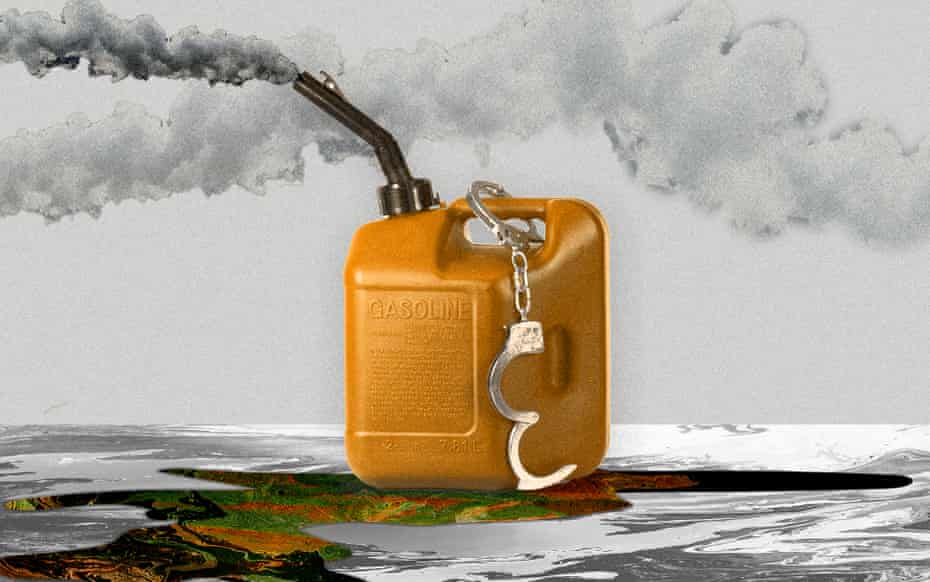
Via an unprecedented wave of lawsuits, America’s petroleum giants face a reckoning for the devastation caused by fossil fuels
After a century of wielding extraordinary economic and political power, America’s petroleum giants face a reckoning for driving the greatest existential threat of our lifetimes.
An unprecedented wave of lawsuits, filed by cities and states across the US, aim to hold the oil and gas industry to account for the environmental devastation caused by fossil fuels – and covering up what they knew along the way.
Coastal cities struggling to keep rising sea levels at bay, midwestern states watching “mega-rains” destroy crops and homes, and fishing communities losing catches to warming waters, are now demanding the oil conglomerates pay damages and take urgent action to reduce further harm from burning fossil fuels.
But, even more strikingly, the nearly two dozen lawsuits are underpinned by accusations that the industry severely aggravated the environmental crisis with a decades-long campaign of lies and deceit to suppress warnings from their own scientists about the impact of fossil fuels on the climate and dupe the American public.
…
Other climate lawsuits, including one filed in Minnesota, allege the oil firms’ campaigns of deception and denial about the climate crisis amount to fraud. Minnesota is suing Exxon, Koch Industries and an industry trade group for breaches of state law for deceptive trade practices, false advertising and consumer fraud over what the lawsuit characterises as distortions and lies about climate science.
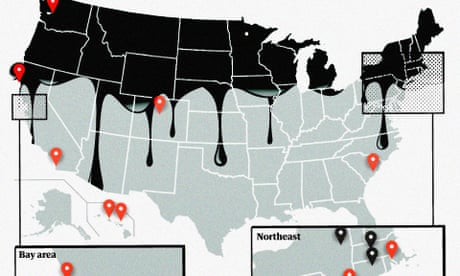
The midwestern state, which has seen temperatures rise faster than the US and global averages, said scorching temperatures and “mega-rains” have devastated farming and flooded people out of their homes, with low-income and minority families most at risk.
Minnesota’s attorney general, Keith Ellison, claims in his lawsuit that for years Exxon orchestrated a campaign to bury the evidence of environmental damage caused by burning fossil fuels “with disturbing success”.
“Defendants spent millions on advertising and public relations because they understood that an accurate understanding of climate change would affect their ability to continue to earn profits by conducting business as usual,” Ellison said in his lawsuit.
Farber said cases rooted in claims that the petroleum industry lied have the most promising chance of success.
“To the extent the plaintiffs can point to misconduct, like telling everybody there’s no such thing as climate change when your scientists have told you the opposite, that might give the courts a greater feeling of comfort that they’re not trying to take over the US energy system,” he said.
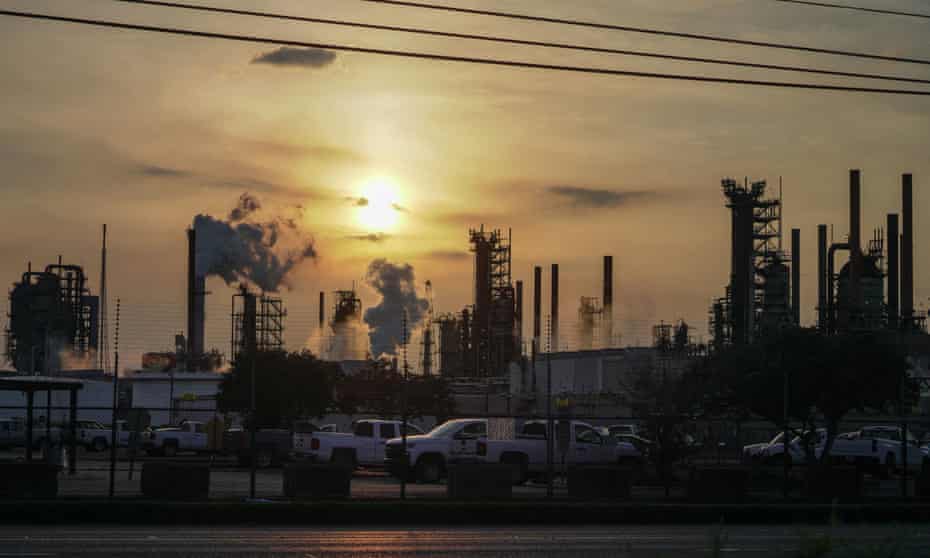
Fighting the facts
Almost all the lawsuits draw on the oil industry’s own records as the foundation for claims that it covered up the growing threat to life caused by its products.
Shell, like other oil companies, had decades to prepare for those consequences after it was forewarned by its own research. In 1958, one of its executives, Charles Jones, presented a paper to the industry’s trade group, the American Petroleum Institute (API), warning about increased carbon emissions from car exhaust. Other research followed through the 1960s, leading a White House advisory committee to express concern at “measurable and perhaps marked changes in climate” by 2000.
API’s own reports flagged up “significant temperature changes” by the end of the twentieth century.
The largest oil company in the US, Exxon, was hearing the same from its researchers.
Year after year, Exxon scientists recorded the evidence about the dangers of burning fossil fuels. In 1978, its science adviser, James Black, warned that there was a “window of five to ten years before the need for hard decisions regarding changes in energy strategy might become critical”.
Exxon set up equipment on a supertanker, the Esso Atlantic, to monitor carbon dioxide in seawater and the air. In 1982, the company’s scientists drew up a graph accurately plotting an increase in the globe’s temperature to date.
“The 1980s revealed an established consensus among scientists,” the Minnesota lawsuit against Exxon says. “A 1982 internal Exxon document … explicitly declares that the science was ‘unanimous’ and that climate change would ‘bring about significant changes in the earth’s climate’.”
Then the monitoring on the Esso Atlantic was suddenly called off and other research downgraded.
What followed was what Naomi Oreskes, co-author of the report America Misled, called a “systematic, organised campaign by Exxon and other oil companies to sow doubt about the science and prevent meaningful action”.
The report accused the energy companies of not only polluting the air but also “the information landscape” by replicating the cigarette makers’ playbook of cherry-picking data, using fake experts and promoting conspiracy theories to attack a growing scientific consensus.
Many of the lawsuits draw on a raft of Exxon documents held at the University of Texas, and uncovered by the Columbia Journalism School and the Los Angeles Times in 2015.
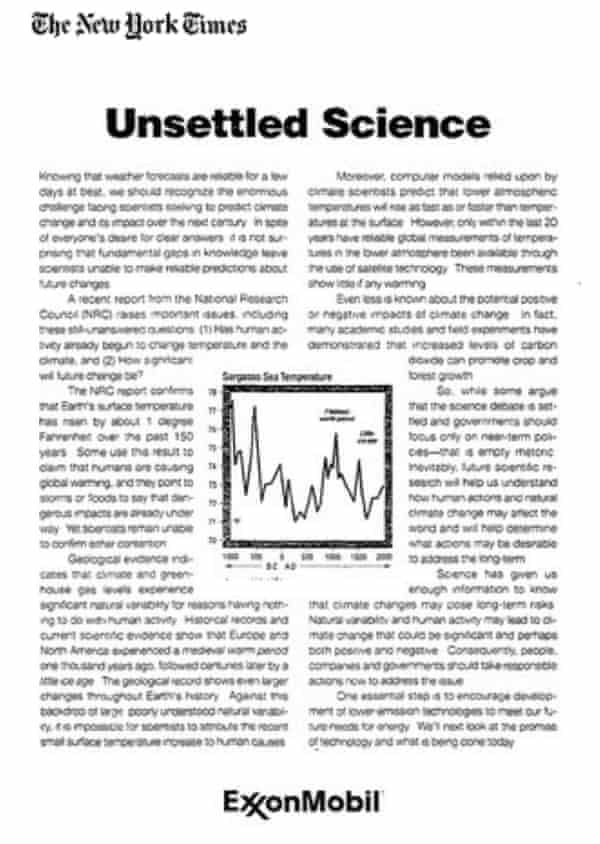
Among them is a 1988 Exxon memo laying out a strategy to push for a “balanced scientific approach”, which meant giving equal weight to hard evidence and climate change denialism. That move bore fruit in parts of the media into the 2000s as the oil industry repositioned global heating as theory, not fact, contributing to the most deep-rooted climate denialism in any developed country.
The company placed advertisements in major American newspapers to sow doubt. One in the New York Times in 2000, under the headline “Unsettled Science”, compared climate data to changing weather forecasts. It claimed scientists were divided, when an overwhelming consensus already backed the evidence of a growing climate crisis, and said that the supposed doubts meant it was too soon to act.
Exxon’s chairman and chief executive, Lee Raymond, told industry executives in 1996 that “scientific evidence remains inconclusive as to whether human activities affect global climate”.
“It’s a long and dangerous leap to conclude that we should, therefore, cut fossil fuel use,” he said.
Documents show that his company’s scientists were telling Exxon’s management that the real danger lay in the failure to do exactly that.
In 2019, Martin Hoffert, a professor of physics at New York University, told a congressional hearing that as a consultant to Exxon on climate modelling in the 1980s, he worked on eight scientific papers for the company that showed fossil fuel burning was “increasingly having a perceptible influence on Earth’s climate”.
Hoffert said he “hoped that the work would help to persuade Exxon to invest in developing energy solutions the world needed”. That was not the result.
“Exxon was publicly promoting views that its own scientists knew were wrong, and we knew that because we were the major group working on this. This was immoral and has greatly set back efforts to address climate change,” said Hoffert.
“They deliberately created doubt when internal research confirmed how serious a threat it was. As a result, in my opinion, homes and livelihoods will likely be destroyed and lives lost.”
Exxon worked alongside Chevron, Shell, BP and smaller oil firms to shift attention away from the growing climate crisis. They funded the industry’s trade body, API, as it drew up a multimillion-dollar plan to ensure that “climate change becomes a non- issue” through disinformation. The plan said “victory will be achieved” when “recognition of uncertainties become part of the ‘conventional wisdom’”.
The fossil fuel industry also used its considerable resources to pour billions of dollars into political lobbying to block unfavourable laws and to fund front organisations with neutral and scientific-sounding names, such as the Global Climate Coalition (GCC). In 2001, the US state department told the GCC that President George W Bush rejected the Kyoto protocol to reduce greenhouse gas emissions “in part, based on input from you”.
Exxon alone has funded more than 40 groups to deny climate science, including the George C Marshall Institute, which one lawsuit claims orchestrated a “sham petition” denying manmade global climate change. It was later denounced by the National Academy of Science as “a deliberate attempt to mislead scientists”.
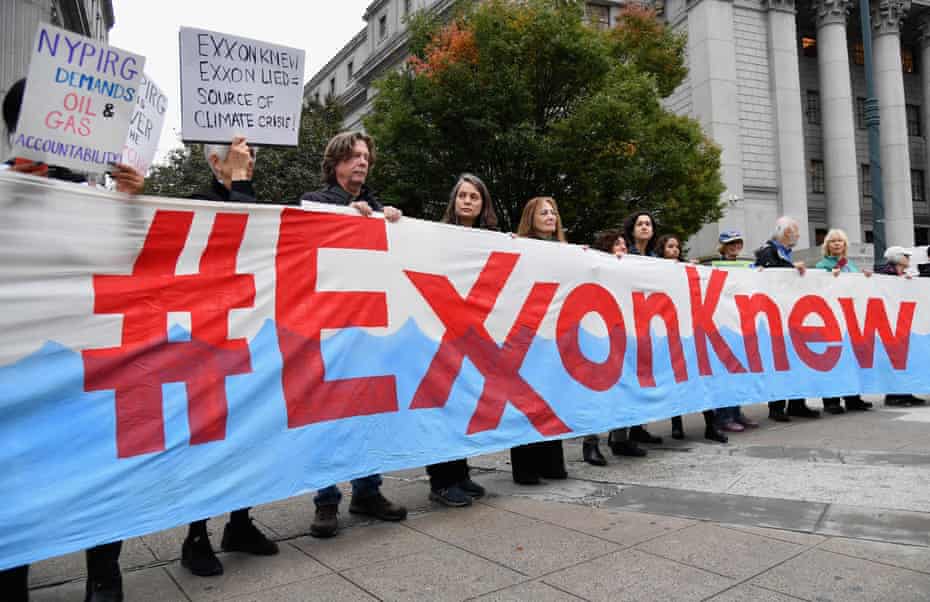
Drilling down
To Sharon Eubanks the conspiracy to deny science sounded very familiar. From 2000, she led the US justice department’s legal team against nine tobacco firms in one of the largest civil cases filed under the Racketeer Influenced and Corrupt Organizations (Rico) Act, which was designed to combat organised crime.
In 2006, a federal judge found that the industry had spent decades committing a huge fraud on the American public by lying about the dangers of smoking and pushing cigarettes to young people.
Eubanks said that when she looked at the fossil fuel industry’s strategy, she immediately recognised big tobacco’s playbook.
“Big oil was engaged in exactly the same type of behaviour that the tobacco companies engaged in and were found liable for fraud on a massive scale,” said Eubanks. “The cover-up, the denial of the problem, the funding of scientists to question the science. The same pattern. And some of the same lawyers represent both tobacco and big oil.”
The danger for the fossil fuel industry is that the parallels do not end there.
The legal process is likely to oblige the oil conglomerates to turn over years of internal communications revealing what they knew about climate change, when and how they responded. Given what has already come out from Exxon, they are unlikely to help the industry’s case.
Eubanks, who is now advising attorneys general and others suing the oil industry, said a turning point in her action against big tobacco came with the discovery of internal company memos in a state case in Minnesota. They included language that talked about recruiting young people as “replacement smokers” for those who died from cigarettes.
“I think the public was particularly stunned by some of the content of the documents and the talk about the need for bigger bags to take home all the money they were going to make from getting people to smoke,” said Eubanks.
The exposure of the tobacco companies’ internal communications shifted the public mood and the politics, helping to open the door to legislation to curb smoking that the industry had been successfully resisting for decades.
Farber, the Berkeley law professor, said the discovery process carries a similar danger for the oil companies because it is likely to expose yet more evidence that they set out to deceive. He said that will undercut any attempt by the energy giants to claim in court that they were ignorant of the damage they were causing.
Farber said it will also be difficult for the oil industry to resist the weight of US lawsuits, shareholder activism and shifting public and political opinion. “It might push them towards settlement or supporting legislation that releases some from liability in return for some major concessions such as a large tax to finance responses to climate change.”
The alternative, said Farber, is to take their chance on judges and juries who may be increasingly inclined to take the climate crisis seriously.
“They may think this is an emergency that requires a response. That the oil companies should be held responsible for the harm they’ve caused and that could be very expensive,” he said. “If they lose, it’s catastrophic ultimately.”
